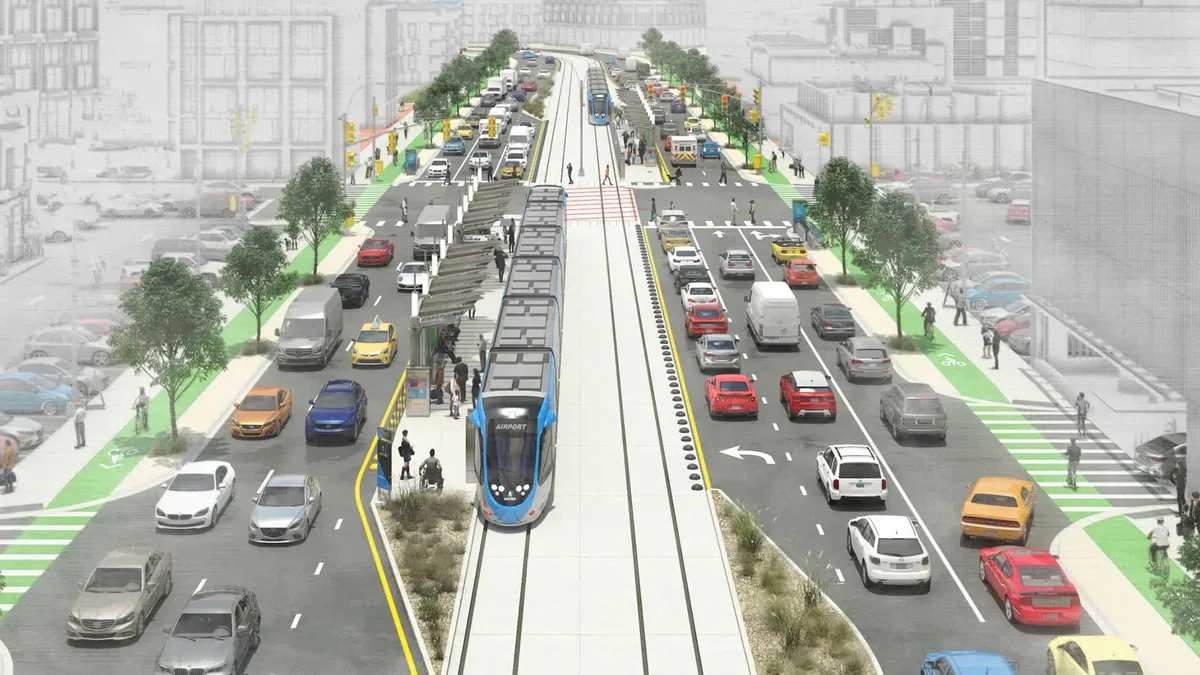Dive Brief:
- The City of Austin, TX is claiming victory over Proposition A, or the Project Connect Initial Investment ballot measure, with preliminary totals showing a 58% vote for the measure and 41% vote against.
The community has approved Prop A for #ProjectConnect! We now have a plan, schedule and funding to create a more connected & equitable community. It's go time! pic.twitter.com/jgRKnnAVTa
— Capital Metro (@CapMetroATX) November 4, 2020
- The approved measure will raise property taxes in the city by 8.75 cents per $100 (approximately 4%) annually, to bring in at least 20% of the needed $7.1 billion for the comprehensive transit plan. Austin Councilmember Ann Kitchen, who supported the ballot measure, told Smart Cities Dive the tax starts "right away ... in fact, it is already on the property tax bill."
- Kitchen said the immediate next steps following Prop A's victory will be "structural." The city's first priority is to pick the five-member board of the Austin Transit Partnership (ATP), which will be responsible for handling all of the contracting and the disbursement of funds for the project. The city has also created a cross-department anti-displacement team which will "start right away" on formalizing equity strategies for Austin's neighborhoods.
Dive Insight:
The approval of Prop A marks a milestone in the city's years-long battle to reimagine its mass public transit. In a press conference on Tuesday night, Capital Metro Board Chair Wade Cooper cited the city's "young voters" who "showed up in droves and took ownership in changing the future of our city," the Austin Monitor reports.
The victory also garnered particular support from climate activists, including the Texas Public Interest Research Group (TexPIRG), whose director called the move "historic." The project has the potential to remove 43,000 tons of carbon dioxide from Austin's air every year, which could make Prop A the city's "largest single investment in preserving climate," Mayor Steve Adler said in September.
"In 20 years, we'll look back at this day as the day that Austin voters decided to take action against climate change and improve our quality of life," TexPIRG Director Bay Scoggin said in a statement.
While it may have been young voters who showed support for Prop A, a map of the total vote count also details where Austin saw the most opposition to the measure. Precincts in West Austin — home to 80%-plus of White residents — were largely opposed to Prop A, which "tells a pretty compelling story," according to local journalist Megan Kimble.
This voting pattern suggests voters of color, who are often the most dependent on the use of transit, were those in support of Prop A, "lest you doubt Austin is a deeply racially and economically segregated city," Kimble tweeted.
When asked what she believes is the reason for this discrepancy, Kitchen said the western portion of Austin simply won't see the benefits of Project Connect as prominently as the eastern portion.
"I'd have to do a bit more analysis, [but] I would say that the western portion of Austin is, although the plan works for them, it works for them in a different way," Kitchen told Smart Cities Dive. "It's more park and rides, some more commuter types of routes, but because of the geography, there's not a rail line running through West Austin."
Kitchen repeatedly emphasized the project's focus on equity, however, which she said is a "really forward-thinking" element to this project that the city hasn't ever seen prioritized to this scale. "Transportation is a key piece of equity, so this is transformational with regard to that," she said.
It will be key for the city and its partners to be transparent with Austinites in how their tax dollars will be spent and prove the advancements toward increased equity, greenhouse gas (GHG) reduction and transportation access. Roger Falk, the transportation policy expert for opposition group Our Mobility Our Future, told Smart Cities Dive in an email that the city has done little to tangibly show how these benefits will be unlocked.
Kitchen said such transparency will be the job of the ATP and Capital Metro, not of the city.












